Disclosure: Meeple Mountain received a free copy of this product in exchange for an honest, unbiased review. This review is not intended to be an endorsement.
Council of Shadows is a 2022 release published by alea (intentionally not capitalized), the strategy games imprint of hobby games and puzzle-producing giant Ravensburger. I got a copy a few months ago and cleared my fall convention haul before getting Council of Shadows to the table.
Part of why I waited, though, was tied to the lack of buzz for this game, which I thought was strange given alea’s pedigree. Over the last two decades, alea has published games such as Puerto Rico, The Castles of Burgundy and The Princes of Florence, amongst dozens of other greats. When Council of Shadows hit the US market in early 2023, I didn’t even know about it until our Ravensburger partners brought the game to my attention.
I got in three plays over the course of just two days, and I mostly like what’s here. Council of Shadows is a bit uneven thanks to its approach, and while it is a game I recommend, I have questions about some of the design choices. Council of Shadows also left some players exasperated by the scoring system, which is both a feature and a bug, depending on your point of view.
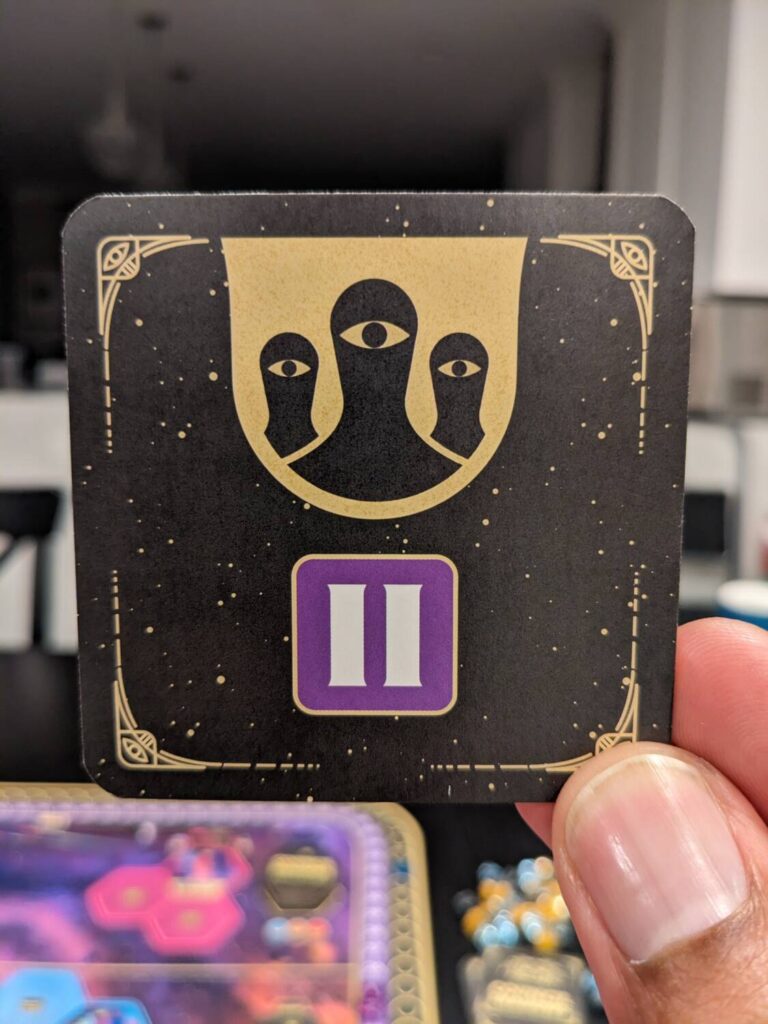
All-Knowing
Council of Shadows is a little tricky to categorize, which I like. The game accommodates 2-4 players, and is essentially a race to satisfy the needs of a powerful council of aliens who have access to technology beyond your wildest dreams. (If powerful technologies are a part of your dream cycle, of course.) To become a member of the Council, players fight to prove to these sheisty aliens that they can harness Energy faster than the competition.
The hook with Council of Shadows is the scoring system. Two mostly-parallel tracks wind around the outside of a map of the game’s galaxies. The outer track measures Consumption. On each turn, a player will have three cards in their small tableau that tracks actions, actions that must be taken in order from left to right. Each card has a Consumption cost, which dictates turn order for the current round as well as the number of points a player must advance on the Consumption track.
The inner track measures Energy, which are essentially points. You begin the game with 20 Consumption and zero Energy. Your goal is to score enough Energy to match your current Consumption level, which levels up your civilization with the Council and thematically grants you a chance to gain some of that sweet alien technology. As a result, the Energy you spend with the Council resets your Energy score to zero.
On paper, this sounded painful. I get to score all of these points, then my score resets to zero? My Consumption marker is constantly going up, so how will I be able to score enough points to level up a second, even a third time? (The game end phase is triggered when one player levels up their civilization a third time.)
But in practice, this will determine whether you come back to Council of Shadows or not. A bit like Evacuation, the game is a race. Sure, there are points to be scored, but in my plays, this has typically come down to who can trigger the third level-up phase and remain ahead of other players during end-game scoring.
And efficiency is rewarded in exceptional ways here thanks to the cardplay. Each player begins play with the same six cards, which are used to gather resources or settle colonies on new planets and galaxies on the map. Ultimately, these colonies are cubes, and these cubes get you stuff. Cool.
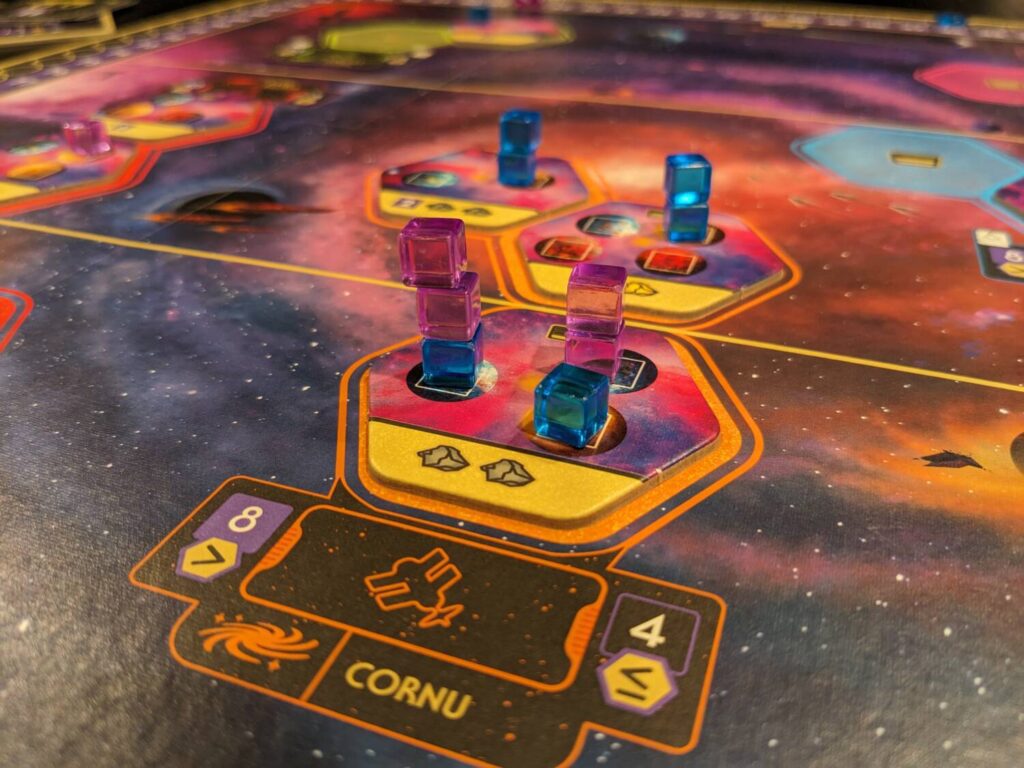
But the start of each round lets players buy up to three cards and/or player board upgrades before taking actions. The cards are mostly better versions of your starting cards, so the card actions don’t get much fancier. But they do get cheaper, in terms of their Consumption costs. Playing three cards that cost 10-12 Consumption when play begins is quite common. But if you can get those same actions for a cost of seven Consumption, you’re going to do it, because that should make it easier to lap your Consumption marker and continue scoring on the Energy track.
Instead of, or in addition to, buying cards, a player can choose to spend resources on their player board instead. Standard stuff—buying upgrades lets you drop cubes on different color planets on the galaxy tiles, or spend a bunch of resources for Energy points. The most intriguing upgrades occur when deciding to upgrade the three card slots, so that a player can begin exploring more advanced “Parsecs” in the middle and upper sections of the map. Card actions can only take place in the tableau slot’s unlocked Parsecs, so spending coal or gold to upgrade these slots becomes imperative pretty quickly.
The iconography in Council of Shadows is mostly clean. Card actions are straightforward, and after a player takes their three actions, the right-most card in their tableau slides off the board and immediately comes back into a player’s hands to add to the board again in later rounds. You can even stack cards on top of other cards if you don’t like the action you have in your second or third slot, to change up your programming mechanism. Council of Shadows can be called many things, but “inflexible” is not one of them.
Once actions are played, the active player can choose to do an Assessment of the entire game board. If a player has a majority presence in a galaxy (made up of 2-5 Solar System tiles, where all the planets reside), they can essentially call for a review by the Council. If the player has more colonies than anyone else in that galaxy, they score a bunch of Energy points. They can do this for each galaxy where they have at least one cube. In exchange, they have to remove one cube from each galaxy that was scored.
It is at this point that we can pause, because my plays have shown that everyone has the same question about the Assessment phase: why the heck would I NOT assess every single place where I have presence, since that scores me the most points?
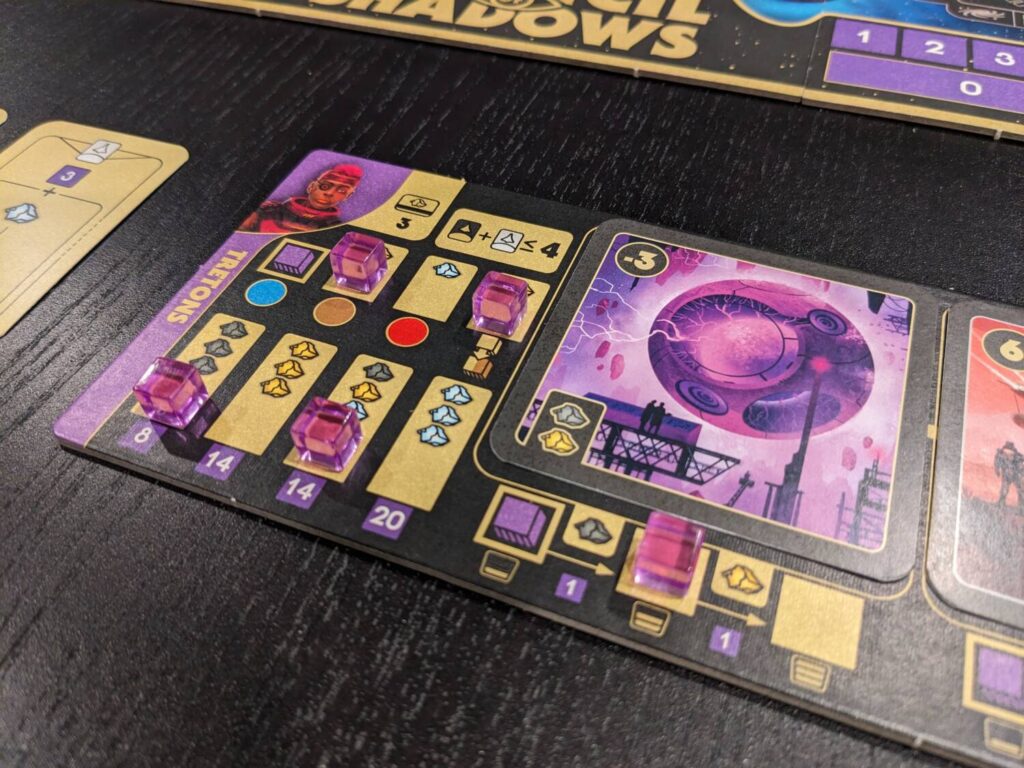
An Area Control Mechanic, Played Alone
Council of Shadows, as noted, is a race around the Energy track. Games look like they will be based on area control scoring, where majorities will score points and leave other players hurting.
But because of the way Assessments take place—at the end of every player’s individual turn, and not at the end of the collective group’s series of turns in a round—every player plays Council of Shadows the same way: assess every galaxy where they have at least a cube, and if they have the majority (which it feels like they always will), remove those cubes and score all the points.
This led my groups to ask a lot of questions, questions that I am also asking as I think about my experience with the game:
- Is there any chance that a settle-and-hold strategy would work? (Our sense is a strongly, profanely worded “no”)
- Why would a person ever take an action where the choices are settle or “harvest” (take a reward shown on each Solar System tile), where points are always the way to go in a game where the game end will be triggered by the person who scores the most points the fastest?
- Why are there so many galaxies to choose from? It’s almost impossible by the mid-game here to be stuck with galaxies that have presence from opponent-placed cubes. That means that if Teddy puts cubes down in the green galaxy, I have like eight other places to place cubes, all of which are empty.
- In a galaxy where two other players have, say, one cube: the player currently assessing a galaxy gets to score points based on their relative position to each other player in that galaxy. That means that if I end the round with three cubes, and three other players have one cube each in the same galaxy, I will score the max amount of Energy points three times, once for each opponent where I have more colonies. That could mean a score of possibly 45 points in a four-player game, which might be enough to not only pass my Consumption marker once, but maybe twice, on the same turn!!
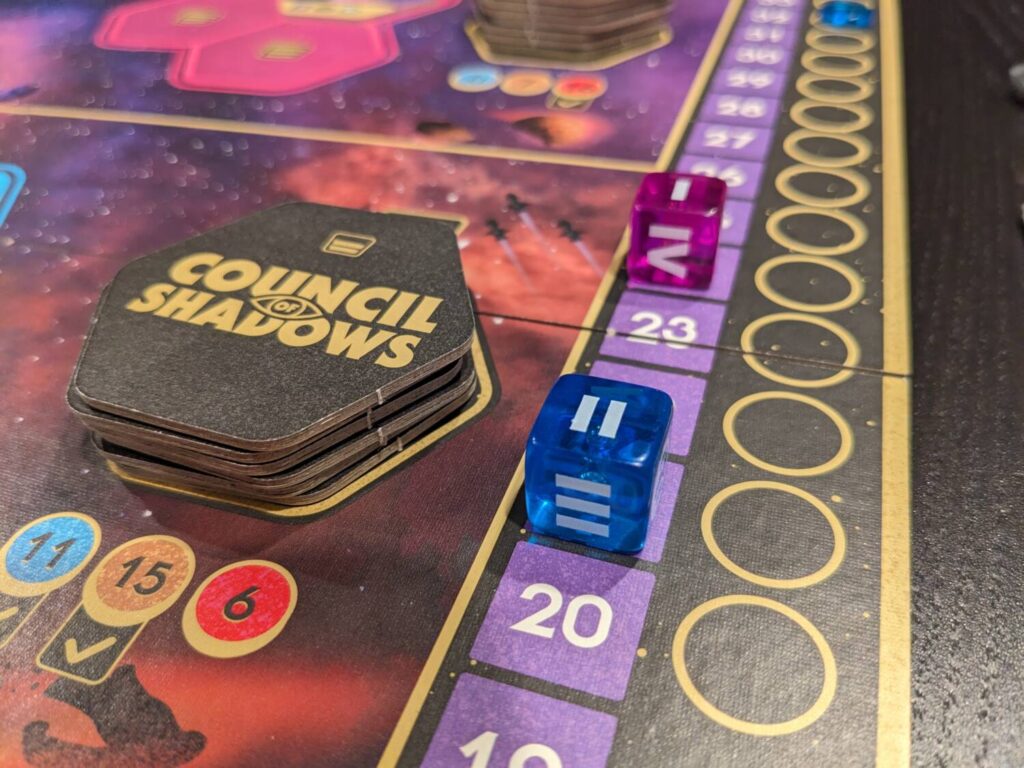
There are other choices here that piqued my curiosity about the design, but this is a start. And that’s before I tell you about some of the comically broken alien technologies that players get when they level up.
When a player does level up (again, leveling up means lapping your Consumption marker by outsourcing it with your Energy marker), players at a tech level beneath the active player get a little something, like resources from the supply. Not bad. But the player who just got the benefit might get something like a fourth card slot action tile, a minus-seven Consumption hit (meaning that it will be easier to level up again), or the most overpowered thing I’ve seen in a game maybe this year—the ability to always pay ZERO Consumption every turn.
When this last card was drawn during a recent play, we collectively decided to throw it out of the game. It was just too good. This is the kind of game-breaking player power that I love in games like Marco Polo II: In the Service of the Khan, but in Council of Shadows, it’s a tricky line. Usually, just getting a card like the zero Consumption card would be a benefit. But that person is probably already winning; are we saying that we should make it even easier for that person to level up a second or third time?
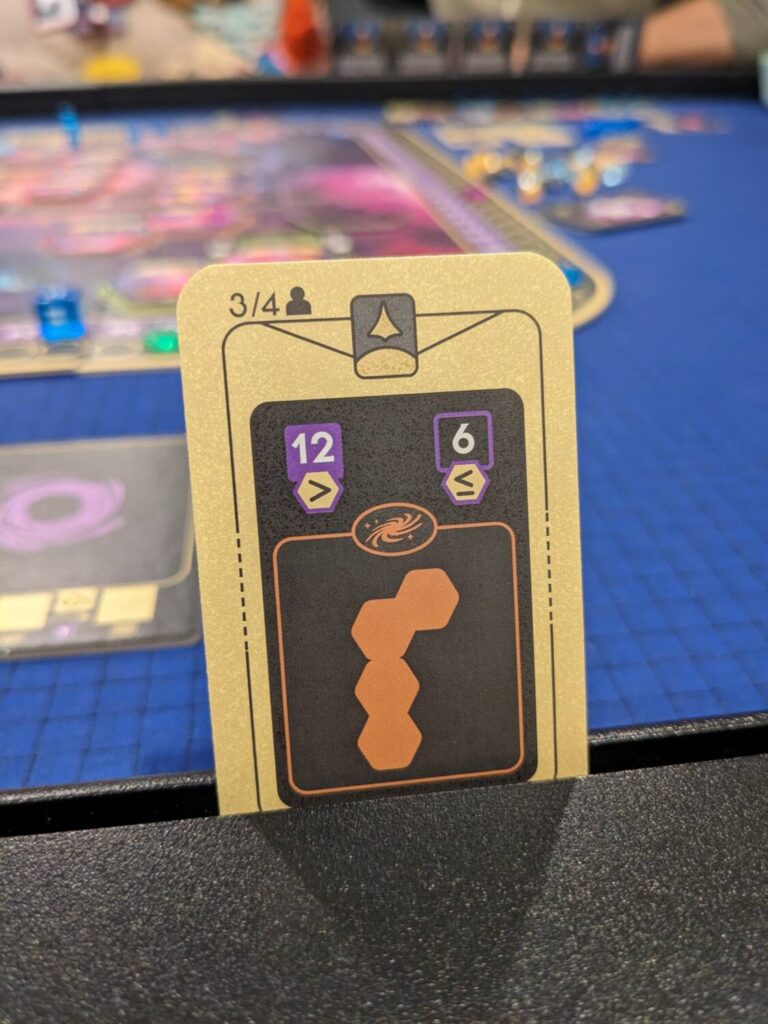
You’re Not Going to Believe This
Despite my many complaints, you really aren’t going to believe this—I’m recommending Council of Shadows as a game you should try.
Yes, the game’s choices led to a lot of questions. I definitely think the game has a runaway leader problem, particularly if a player buys some of the better AI cards available in the card market. And then there are minor issues for me, like the idea that the Light Bonus cards are top-decked scoring cards, meaning you might luck into some extra points at the end of the game.
But still! The turns are interesting thanks to the mechanic of how card actions are taken and cards slide off of your board. The upgrade system does feature real choice, and making the wrong ones—particularly with the parsec upgrades made available on the three card spaces—can really hurt if you plan poorly. I don’t think there are a lot of paths to victory, but if the race is fun and the game can be played in under an hour, I can work with it!
More fun: the person who levels up their die to level III first gets a cardboard throne.
YES! THE PERSON WHO TRIGGERS THE END GAME GETS A COMPLETELY USELESS BUT REALLY COOL CARDBOARD THRONE! You want me on that throne…you need me on that throne, are you with me??
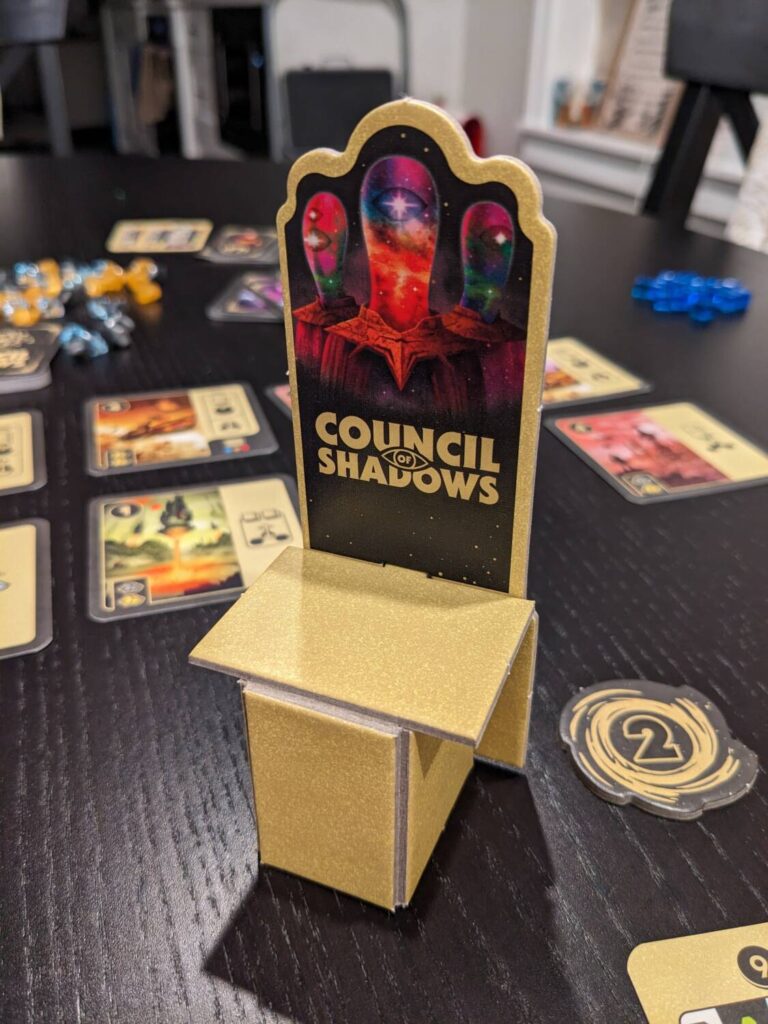
I won’t lie to you, dear reader—Council of Shadows has flaws. But I was surprised how much I wanted to play it again after each game. It’s a game I would always play but never bring to the party, if that makes sense. If YOU want to play Council of Shadows, I’m down. If I’m looking at games on my shelf, I’m almost never picking it over the 50 other Euros in my game room.
And you can get this game from sources as vast as the Ravensburger webshop or Target for under $50. There’s even mini-expansion content included in the base game to extend the life of Council of Shadows, in the form of variable player powers and different Consumption start locations. I haven’t played the game with the expansion content yet; I’ll save that for another review if necessary.
Council of Shadows does just enough to cross into safe haven territory for me. I’m holding onto my copy, just in case someone drops by and wants to check out the throne!


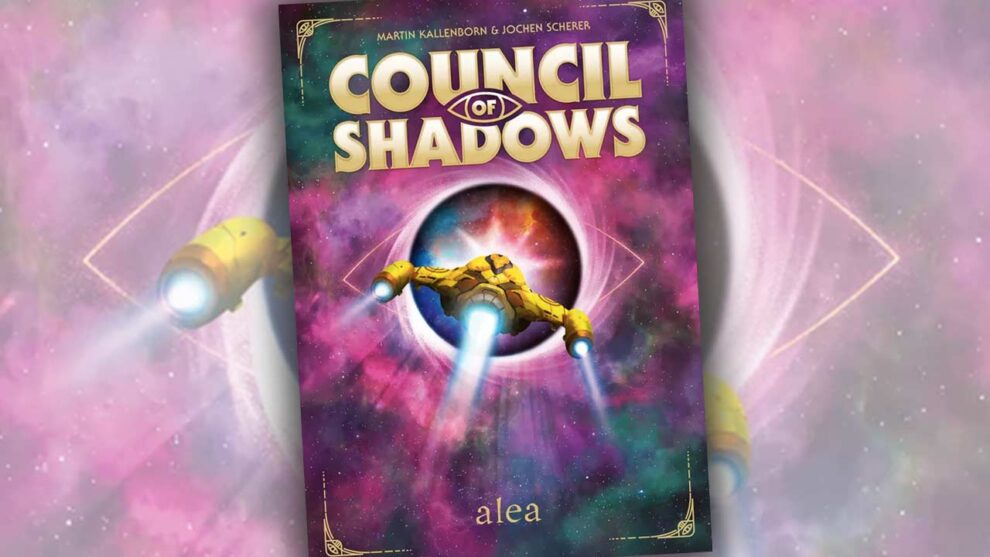









This review was so awe inspiring (or, perhaps, revealed so much about the Council of Shadows) that Andy did not want comments on to be available. I have assured him that this is just another wonderful review from you and he has graciously allowed me to say so.
Thanks for a great read!